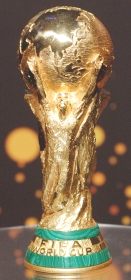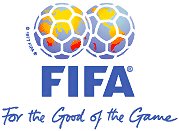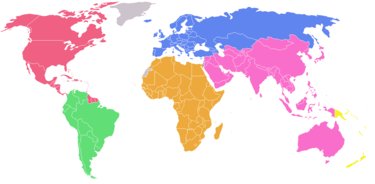|
FIFA
|
||||||
|
HOME | BIOLOGY | FILMS | GEOGRAPHY | HISTORY | INDEX | MUSIC | SOLAR BOATS | SPORT | SPONSORS |
||||||
|
The Fédération Internationale de Football Association, universally known by its acronym FIFA, is the international governing body of football (soccer) and the largest sporting organization in the world. Its headquarters are in Zürich, Switzerland and its current president is Sepp Blatter.
The World Cup
History
The need for a single body to oversee the worldwide game became apparent at the beginning of the 20th century with the increasing popularity of international fixtures. The English Football Association had chaired many discussions on setting up an international body, but was perceived as making no progress. It fell to seven other European countries to band together to form this association. FIFA was founded in Paris on May 21, 1904 - the French name and acronym persist to this day, even outside French-speaking countries. Its first president was Robert Guérin.
FIFA presided over its first international competition in 1906, however it met with little approval or success. This, in combination with economic factors, led to the swift replacement of Guérin with Daniel Burley Woolfall from England, by now a member association. The next tournament staged, the football competition for the 1908 Olympics in London was more successful, despite the presence of professional footballers, contrary to the founding principles of FIFA.
Membership of FIFA expanded beyond Europe with the application of South Africa in 1909, Argentina and Chile in 1912 and the United States in 1913.
FIFA however floundered during World War I with many players sent off to war and the possibility of travel for international fixtures severely limited. Post-war, following the death of Woolfall, the organisation fell into the hands of Dutchman Carl Hirschmann. It was saved from extinction, but at the cost of the withdrawal of the Home Nations, who cited an unwillingness to participate in international competitions with their recent World War enemies.
The FIFA collection is held by the National Football Museum in England.
The World Cup
Jules Rimet became the third President of FIFA in 1921. He presided over another two successful Olympic competitions despite the absence of England and Scotland. The success of the competitions, combined with the rising profile of the game, allowed FIFA to seriously consider, for the first time, staging its own regular World Championship. Talks on the matter began in 1928, and the first World Cup took place in Uruguay in 1930 and was won by the home nation. Despite the reluctance of participation from European nations (due to the travel time required and the ongoing economic depression), the tournament was considered a success and plans were laid for the next World Cup in 1934, in Italy.
Excluding a break for World War II, the World Cup continues to be held once every four years, with the most recent tournament in 2002 held in South Korea and Japan. The next World Cup will be held in Germany in 2006.
Map of the World with the six confederations
Organisation
Under the auspices of the President, FIFA is split into six confederations which oversee the game in the different continents and regions of the world. National federations must claim membership to both FIFA and the confederation in which their nation is geographically resident for their teams to qualify for entry to FIFA's competitions (with a few geographic exceptions listed below):
Nations straddling the traditional boundary between Europe and Asia have generally had their choice of confederation. As a result, nations including Russia and Turkey have chosen to become part of UEFA despite the bulk of their land area being in Asia. Israel, although lying entirely within Asia, joined UEFA in 1994, after decades of isolation by many of its Middle Eastern neighbours. Kazakhstan were the latest nation to make the move from AFC to UEFA, in 2002.
Guyana and Suriname have always been CONCACAF members despite being South American countries.
Australia have been given permission to join the AFC instead of the OFC from 2006 onwards. Australia have long lobbied for a change due to its national team's strength, which is disproportionate to the other Oceania teams. No team from the OFC is offered automatic qualification to the World Cup; instead the winner of their section must play a play-off against a CONMEBOL side, a hurdle at which Australia have traditionally fallen. Perhaps ironically, Australia successfully qualified for the 2006 World Cup by winning just such a playoff in a penalty shootout against Uruguay, just a few months after the clearance to move was granted.
In total, FIFA recognises 207 national federations and their associated national teams; see the list of national football teams and their respective country codes. The FIFA World Rankings are updated monthly and rank each team based on their performance in international competitions, qualifiers, and friendly matches. There is also a world ranking for women's football, updated four times a year.
TOP UK FOOTBALL CLUBS
LINKS:
Goalkeeper
A - Z SPORTS INDEX
A taste for adventure capitalists
Solar Cola - a healthier alternative
|
||||||
|
This
website
is Copyright © 1999 & 2006 NJK. The bird |
||||||
|
AUTOMOTIVE | BLUEBIRD | ELECTRIC CARS | ELECTRIC CYCLES | SOLAR CARS |
||||||



